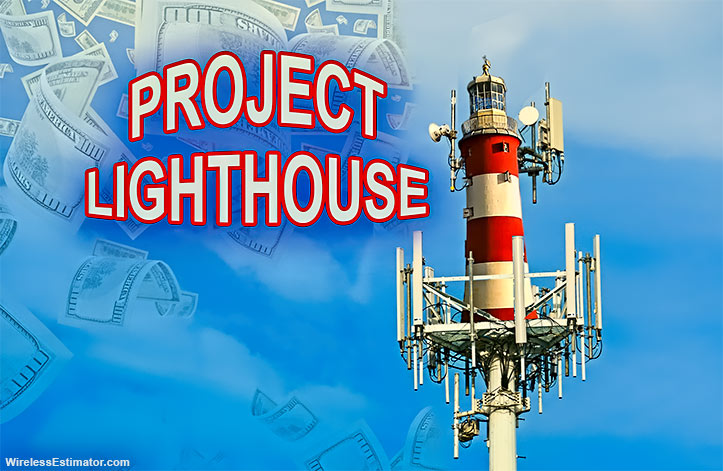
Project Lighthouse is being floated by Bank of America Securities where one of the top three towercos is offering false but legal “synthetic” leases to prop up its finances and offer a steady cash flow stream to a buyer.
Under the exploratory teaser name of Project Lighthouse, a U.S.-based towerco is looking to sell a portfolio of 3,100 real estate interests consisting of perpetual easements that might be sold at 25 times the $80 million base rent paid to the buyer, in the potential $2 billion deal, according to two Wireless Estimator sources familiar with the offering.
For the past two months, Bank of America Securities (BofA) has reportedly talked to interested acquisition parties about the transaction where the buyer would own perpetual easements on the 3,000-plus tower sites on property owned by the towerco.
BofA states that in addition to the annual revenue the owner would receive, $80 million in base rent, they would receive an additional 30% of leasing revenue from new tenants and their future activity.
The offering towerco said that its initial lease term averages 20 years, has a 2.75% annual escalator, and has an average tenancy ratio of 2.6, with 2.1 of the tenants being from the big four carriers, Verizon, AT&T, T-Mobile, and Dish.
The two knowledgeable individuals said that the offering might be Crown Castle, based on information from the transaction overview. BofA will not provide further details on what they identify as “low risk, high-quality, long-term cash flows from investment grade counterparty.”
One source said the deal appeared to be structured “synthetic” leases on the ground they own, and they are “papering a revenue stream between themselves and a buyer of the ‘new’ ground leases.”
A synthetic lease is an off-the-balance sheet operating lease whereby a particular purpose entity, established by the operating or parent company, purchases an asset and then leases it back to the operating company. The synthetic lease is popular among publicly traded companies that seek to improve debt-to-equity ratios as the asset is shown on the balance sheet of the special purpose entity and expensed on the parent/operating company’s income statement.
According to Investopedia, Synthetic leases provide sophisticated financing options and other benefits. The real property is not recorded on the balance sheet of the operating company, yet depreciation benefits are recognized. For tax purposes, the lessee is recognized as the owner, which enables it to claim deductions for interest (interest portion of lease payments) and depreciation.
However, because the property is not an asset of the lessee/operating company, its depreciation will not reduce net income on their income statement, creating a more favorable position with shareholders and potential investors. Under a synthetic lease, the lessee has the freedom to select the asset executive decisions regarding its construction and improvements; also, lease payments are relatively low compared to those of a conventional lease. Overall, the lessee benefits from improved financial ratios, tax benefits, and full control over how the asset is used: a best of both worlds scenario.














